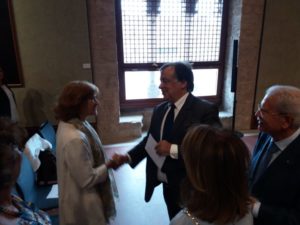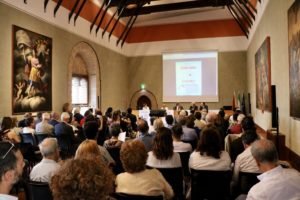European Day of Jewish Culture – Diaspora, Identity and Dialogue; the Right Way for a Future of Coexistence
“This year we chose Sicily as the focus of this 18th edition, with events in five cities – Palermo, Catania, Agira, Camarina and Syracuse -. A Sicily that, as you said mayor Orlando, lives every day, as we all do, looking at the future, getting strength from its ancient past and where the rebirth of the Jewish culture, after ages of silence, is a rebirth for the whole region”. This is what the president of the Union of Italian Jewish Communities (UCEI) Noemi Di Segni said during this morning inauguration held in Palermo for the 18th European Day for the Jewish Culture, celebrated throughout Italy.
Welcoming president Di Segni in a so significant place as Palazzo Steri was the mayor Leoluca Orlando, who mentioned the multicultural and integration history of the city. “Palermo is a proudly European but also Middle-Eastern city believing in the Jus soli and engaged in making different cultures dialogue with one another – Orlando underlined to Pagine Ebraiche – It’s a mosaic-like city made of many tiles and each one represents a different culture, like the Jewish one. The mayor mentioned the glorious Jewish past of Palermo, which was traumatically interrupted at the end of the 15th century, the Jews being expelled from Sicily on the orders of the Spanish sovereigns. A past today come back to life thanks to the commitment of the small Jewish community of Palermo, which is going to have soon her own synagogue. This will be the first after 500 years, Noemi Di Segni said, thanking the local diocese for granting to the new-born Jewish section of the Sicilian capital the former oratory of Santa Maria del Sabato, where the new synagogue will appear. The memorable signing for the concession of the spaces by the archbishop Corrado Orefice was on last Friday. To sign the documents were the president of the Jewish community of Naples Lydia Schapirer and the representative of the Jewish section of Palermo Evelyne Aouate in presence of the vice president of UCEI Giulio Disegni.
 This project speaks about a living Hebraism and the proof is given by the events held throughout Italy, from Turin to Rome, from Venice to Naples, besides all the Sicilian initiatives, Catania being the main spot in the afternoon. An important message was delivered by an eminent representative of the isle: “Identity and dialogue is the focus of this year Day of the Jewish culture – the message of the President of the Republic Sergio Mattarella – and I want to add remembrance and responsibility, that sense of responsibility of who wants to remember to avoid new degenerations of social coexistence values that once made a fierce regime-led state turn against its own people, against helpless humans”.
This project speaks about a living Hebraism and the proof is given by the events held throughout Italy, from Turin to Rome, from Venice to Naples, besides all the Sicilian initiatives, Catania being the main spot in the afternoon. An important message was delivered by an eminent representative of the isle: “Identity and dialogue is the focus of this year Day of the Jewish culture – the message of the President of the Republic Sergio Mattarella – and I want to add remembrance and responsibility, that sense of responsibility of who wants to remember to avoid new degenerations of social coexistence values that once made a fierce regime-led state turn against its own people, against helpless humans”.
“My wish – Mattarella goes on – is that, through dialogue, the new generations can start a collaboration to fight and defeat terrorism, building a coexistence with new and growing positive achievements”. Many were the celebration occasions to talk about the Jewish Italian world, which however on this September Sunday does not forget to give its support to a damaged city: Livorno, which was hit by a cloudburst, causing various casualties. The local Community has suspended today initiatives and expressed, as all the Jewish communities in the peninsula did, its support to the victims’ families.
Going back to Palermo inauguration, protagonists of the morning event (started with the visit of the city through its Jewish footprints) together with Di Segni and mayor Orlando, – introduced by Palermo University’s vice-rector Laura Auteri – were Rafael Erdreich, Minister Counsellor at the embassy of Israeli state in Italy, the vice-president of the Sicilian regional assembly Giuseppe Lupo and rav Gadi Piperno, UCEI responsible for the Southern Italy Project. The latter talked about the etymology of the Hebraic word for Diaspora, Golah. “In the Hebraic language Golah means exile, being forced to live one’s own country”, Piperno explained, also saying that the same term is the root of Legaloth, to reveal, to unveil. If it’s true that the Jewish people suffered the exile, Piperno said, on the other hand it was also able to change this experience in a positive way, revealing and keeping its culture and identity in the dominant society, and so giving an essential help for the development of the latter, integrating and rediscovering itself.
This revealing and rediscovering is the centre of this day dedicated to the Jewish culture, “a consolidated appointment of key importance” Erdreich said. But it is also a chance to deliver a message to the entire society, as UCEI president said in her applauded speech: “the subject of the Diaspora, urged by the European Day for the Jewish Culture, becomes today the subject of integration” Di Segni spoke referring to the hundreds of thousands of people fleeing from Africa and Middle East to Europe. It’s our duty, the president continued, “as individuals and as community, to respond to whom is asking us for help, with the essential support of national, European and international institutions, which we expect to want and know how to manage a complex and tragic phenomenon. A phenomenon which should not just raise human compassion nor be used as an instrument by emerging hatred orators. It can and must be managed. With determination and with the whole Europe. With a daily engagement for a cultural integration, both from us and from who decides to stay on our land and to live in this Country. Integration doesn’t mean assimilation nor loss of one’s identity; it means relating with the culture, laws and rules of the Country which hosts us first and welcomes us as new citizens then”.
*Translation made by Rachele Ferin, student at the Advanced School for Interpreters and Translators of Trieste University, intern at the newspaper office of the Union of the Italian Jewish Communities.

